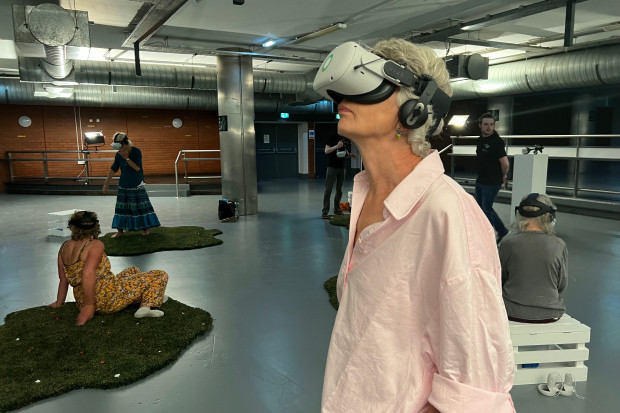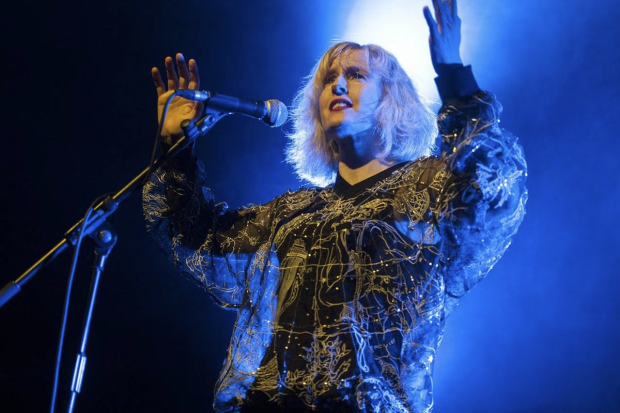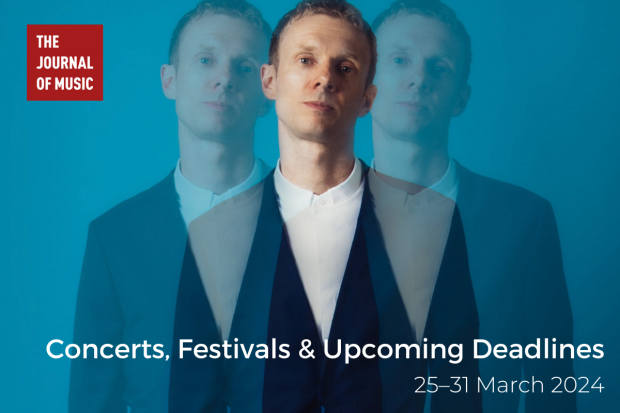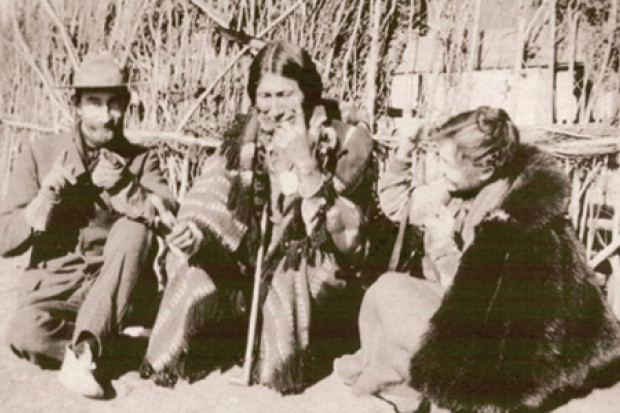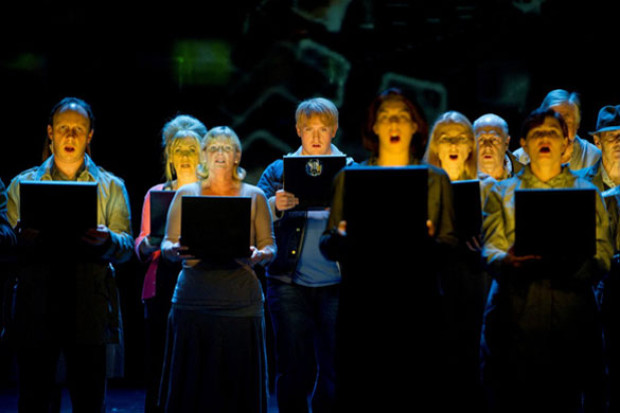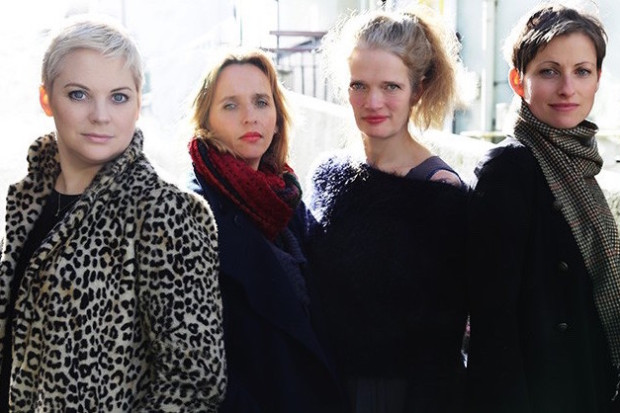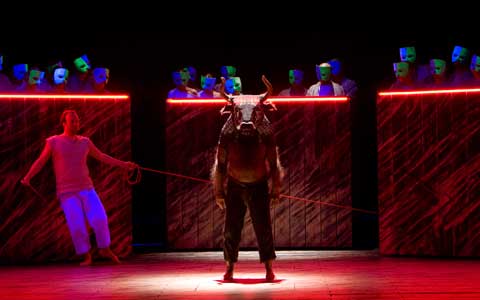
Rethinking Opera
Ask most people what’s wrong with contemporary opera and they will suggest two things: the music and the singing. I tend to agree, but why are the principal ingredients of a form with such a glorious history so problematic for modern audiences? Hollywood produces new film dramas underscored with near-continuous music every day, and racks of soundtrack albums in record shops demonstrate the popularity of this music. At the same time the most profitable shows in the theatres of Broadway and the West End are musicals, packed with singing actors. By contrast, most contemporary operas play for short runs to often bemused audiences; they are rarely recorded, even more rarely revived.
In July 2008, when Harrison Birtwistle’s new grand opera, The Minotaur, was premiered at the Royal Opera House in London, it was one of the topics chosen for Newsnight Review, BBC2’s weekly arts discussion show. On the panel was the film critic Joe Queenan who said of the Birtwistle, ‘People say “Is classical music dead or dying?” Go to Covent Garden and you can view the corpse’. If he was intending to ruffle the feathers of the classical music establishment he certainly succeeded, as a quick pass through the blogosphere will confirm, but while his judgement may have been provocatively simplistic, Queenan’s annoyance with The Minotaur is symptomatic of a widespread disaffection with modern opera.
Opera is, above all, a dramatic form, its defining feature being that its dramas are played out in music by singers. In the most successful operas of the past – Monteverdi, Mozart, Wagner, Puccini, for example – everything we see and hear flows from dramatic necessity: the musical idiom, the words, the pace and pitch of the vocal lines. The overture to The Marriage of Figaro creates a frame for the intricate power struggle which is to follow, while the absence of an overture in La Bohème tumbles us straight into the lives of the characters, as if there was no break between their lives and ours.
But because we know these works so well it is easy to forget that each grew out of a radical re-thinking of theatrical convention; new subjects demanded new dramatic modes. How many operas of the last 100 years have carried on this tradition of innovation? No more than a handful: Alban Berg’s Wozzeck, Philip Glass’s Einstein on the Beach… it’s not a list I find easy to extend. As the form has declined, attempts to disguise this decline have become ever more energetic; the concept-led ‘directors’ opera’ of Patrice Chéreau, Harry Kupfer, Peter Sellars and others has attempted to cover up the absence of new ideas by shoe-horning old texts into new theatrical shapes.
Sellars’ 1980s staging of Mozart’s Don Giovanni re-located the drama to the streets of New York, with the aristocratic title character now a drug baron. Chéreau and Kupfer both directed controversial productions of Wagner’s Ring cycle at the Wagner Festival in Bayreuth, Chéreau in the late-70s setting the epic drama in the Industrial Revolution, Kupfer a decade later finding in it a Marxist view of history.
All were very successful coups de théâtre, adding an attractive dose of contemporary relevance to old favourites, but they also fostered the growth of a culture in which it seemed to be the producer-director, rather than the composer or librettist, who created the ultimate meaning of any operatic project. It’s been a dangerous illusion; these days opera houses run courses to show composers how to write effective operas, whereas history shows us that dramatic innovation in opera has always been led by composers not institutions.
So many things have changed the ways in which we experience drama – film, amplification, telecommunications – yet most investment in new opera still goes into works in which singers with big voices attempt to project over symphony orchestras. The singers act out stories with beginnings, middles and endings and articulate their thoughts and feelings through vocal lines whose contours owe more to musical fashion than to the expressive identity of individual characters within the drama. There is little sense in most new operas that their creators have given any serious consideration to whether or not it is still appropriate to use a theatrical apparatus perfected by Wagner in the 1870s and 80s.
Existing operatic institutions have themselves become part of the problem. Their existence inhibits development because, although grand opera houses like Covent Garden and La Scala are wonderful spaces, there is no reason why the fact of their existence should be enough to make them best suited to new work. As long as new works continue to be created for the existing resources of these imposing venues, the problem will remain; how can composers innovate when the very elements which lock opera so firmly in the past are the prerequisites of their commissions?
The opera orchestra steadily grew in size between 1600 and 1900 to provide the spectacle that would maintain opera’s status as the most overwhelming of media, but in the era of surround-sound cinema and stadium rock that status is gone forever. Similarly, operatic vocal production was developed to allow singers to fill large theatres; it’s an impressive physical feat but it’s quite unnecessary in an age when discreet amplification is the norm in most other forms of theatre. More pertinently, vocal style is probably the biggest hindrance to most people’s willingness to engage with opera. Although theatre-goers accept that in musical theatre characters will periodically express themselves in song, the growing popularity of shows like Mamma Mia and We Will Rock You which are built around existing music suggests that many now prefer to hear characters burst into songs whose familiarity draws the experience of audiences and characters closer together. Small wonder then that they find the strange contortions of operatic vocal writing so unattractive.
Nor, in most contemporary opera, is there an obvious dramatic reason why these characters should sing rather than talk, or why their singing should be dominated by the angular melismas or the impoverished recitative which are the standard vocal repertoire of so many new operas. There are exceptions, of course, although it is telling that the most successful new operas of the last few decades owe their success to the extraordinary strains they place on the traditional fabric of opera. The dazzlingly profuse vocal writing of Gerald Barry’s The Bitter Tears of Petra von Kant makes a spectacle of the voice on a scale rarely heard since Handel; by refusing to recognise the limitations of their traditional instrumental and vocal resources, Barry’s operas make a compelling travesty of the medium. But these exceptions are rare, succeeding in spite of themselves.
Nevertheless I see no intrinsic reason why there can not be a form of theatre involving singers and music which has rather more to do with the experience of people in the twenty-first century and which makes a more sophisticated combination of voices and music than that found in musical theatre. I would like to advocate a fundamental reform, a return to first principles, as if Orfeo and all the subsequent history of opera had never happened, an attempt to imagine a form of theatre which entirely depends on live music and singing. Unlike most contemporary opera this new reformed opera will probably have something to do with the great theatrical innovators of the last 100 years – Bertolt Brecht, Samuel Beckett, Merce Cunningham, Pina Bausch, for example – and it will probably use new spaces and new instrumental media; it may even have something to do with Jennifer Walshe’s Barbie melodrama, XXX_Live_Nude_Girls, which was reviewed in the December-January issue of this journal. Imagine theatre in which music was not just a suggestive soundtrack but the drama itself, in which singers sang not because they happened to be opera-singers, but because singing was an essential part of their characters’ identities. It could be quite something.
Published on 1 February 2010
Christopher Fox is a composer, teacher and writer on music.












